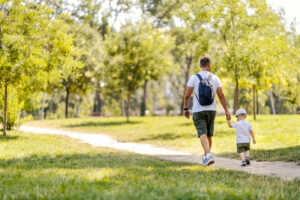 Summer is known to be a time of relaxation, vacations, and mood-lifting weather. But despite the leisurely pace of living, the season can also bring a sense of anxiety and stress, as routines become less defined, hot weather takes a physical toll and the logistics of trip planning add more to the to-do list.
Summer is known to be a time of relaxation, vacations, and mood-lifting weather. But despite the leisurely pace of living, the season can also bring a sense of anxiety and stress, as routines become less defined, hot weather takes a physical toll and the logistics of trip planning add more to the to-do list.
It’s normal to feel simultaneously excited and anxious during the summertime, and understanding why and how to mitigate the latter can help you enjoy the season to the fullest.
Anxiety during the summer
Heat
The hallmark of summertime is a hot summer day. Basking in the sun and spending time outdoors is a surefire way to release endorphins and absorb vitamin D, but living in areas with particularly grueling heat — or enduring unusual heat waves — can have the opposite effect.
High temperatures put us at risk of heat stroke and dehydration, leading to known physical health risks, and such weather depletes energy levels, leading to more frequent feelings of exhaustion and even cabin fever due to staying indoors more frequently.
But there are even more sinister effects of prolonged heat exposure. According to a study published in JAMA Psychiatry, “ mental health-related emergency department visits found an 8% increase in mental health visits on the hottest days of summer compared with the coolest days. The increase ranged from 5% to 11% across different disorders.” Substance abuse, mood, and anxiety disorders were found also to be exacerbated by extreme heat.
Fear of Missing Out
This time of year always sees higher travel volumes, but social media has heightened the sense of FOMO, or fear of missing out, as you can get detailed, real-time access to your friends’ and relatives’ vacations.
Comparing our present, day-to-day lives to others’ curated social media content can lead to a sense of inadequacy, so be aware of thoughts that create feelings of jealousy or insecurity.
Routine disruption
Routines provide the necessary structure and stability to each of our lives. And though vacations can be a time for relaxation or adventurous exploration, regardless of the type of trip you’re embarking on, it is a departure from your current routine, which can cause anxiety and stress.
While many of us need a break from our jobs, not working can surface negative feelings due to a perceived lack of productivity or advancement. During vacations, we are also more tempted to eat or drink less healthily, and maintaining a regular exercise schedule can be more difficult.
Financial stress
Flight, lodging, and transportation costs have been steadily increasing, and summertime is almost always synonymous with elevated prices due to higher demand. While a break from work may sound relaxing, the financial toll it can take may also increase stress levels. Before booking a trip, reflect on the type of experience you’d like to have — how you want to feel, and what activities you’d like to prioritize — so that you don’t feel a sense of buyer’s remorse due to reactive spending.
Be aware of how social media FOMO can influence your habits as well. A 2023 survey from Credit Karma found that nearly 40% of Gen Z and almost 30% of millennials have been influenced to spend money they don’t have on travel expenses upon seeing their peers’ social media.
Social gatherings
Similar to the winter holidays, summertime often means family vacations, weddings, and social events with loved ones. Such gatherings can be joyful and fulfilling, but tense relations with certain peers or family members can also evoke feelings of animosity, resentment, or uneasiness.
How to decrease summertime anxiety
Deep breathing
The benefits of mindful breathing and meditation are hard to overstate. Data, including National Institutes of Health studies, have repeatedly shown that consistent mindfulness breathing and therapy programs significantly reduce depression and anxiety.
Such practices can help you maintain focus and identify the sources of anxiety so you can work toward confronting some of the culprits.
Establish a daily routine
Whether you are hosting visitors or taking a vacation, create a plan to mitigate as much routine disruption as possible. Even if you can’t dedicate as much time to your typical daily tasks, intentionally schedule in time to do what makes you feel grounded each day, whether that is journaling, meditating, reading, or going for a walk. Conversely, having an all-or-nothing approach while on vacation will only make you feel more derailed during and after your vacation and likely increase anxiety levels upon the return to your regular schedule.

Exercise and eat healthy
Maintaining your diet and exercise routine will undoubtedly change when you’re on vacation or hosting guests, but don’t let it falter too much. Even if you can’t complete your full workout routine or eat your regular meals, schedule some exercise time, and offer to buy groceries or plan meals that more closely adhere to your diet.
Budget
Excessive, reactive spending is never easier than when you’re on vacation, but it’s often not always followed by positive emotions. To avoid financial guilt, create a realistic budget — daily or weekly — that is easy to track. This will crystallize what you feel most comfortable spending more money on and what costs you’d like to keep to a minimum.
Anxiety can occur at any time of the year, but it’s important to be aware of how this season may exacerbate underlying mental health conditions. Be sure to take care of your physical and mental well-being, and seek a therapist to discuss and manage anxiety-related symptoms.

The preceding article was solely written by the author named above. Any views and opinions expressed are not necessarily shared by GoodTherapy.org. Questions or concerns about the preceding article can be directed to the author or posted as a comment below.



Please fill out all required fields to submit your message.
Invalid Email Address.
Please confirm that you are human.
Leave a Comment
By commenting you acknowledge acceptance of GoodTherapy.org's Terms and Conditions of Use.